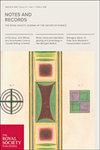1667-70年英国皇家学会早期的火药争论
IF 0.6
3区 哲学
Q3 HISTORY & PHILOSOPHY OF SCIENCE
Notes and Records-The Royal Society Journal of the History of Science
Pub Date : 2020-03-20
DOI:10.1098/rsnr.2018.0050
引用次数: 0
摘要
1667年,托马斯·亨肖的《索尔佩特与火药史》发表在托马斯·斯普拉特的《皇家学会史》上。三年后,亨肖的作品遭到了臭名昭著的反皇家学会小册子作者亨利·斯塔贝的严厉审查。我认为,对斯塔贝来说,亨肖不仅仅是皇家学会的被动代表,他可以通过皇家学会来表达自己的愤怒,而且亨肖研究的主题火药也很重要。Henshaw和Stubbe都有意且有策略地使用火药。在这篇文章中,我探讨了英国皇家学会决定出版火药“巴科尼亚历史”的原因。首先,我认为火药的崇高地位被用作实验追求的理由,它与该学会的祖先弗朗西斯·培根有着直接的联系。但斯塔贝,这位已经是皇家学会评论家的人,碰巧知道这一点,这使他在撰写对亨肖论文的批评文章方面处于独特的地位。其次,火药可以揭示巴科尼亚的历史以及巴科尼亚学者在实施这一项目时所面临的挑战。本文章由计算机程序翻译,如有差异,请以英文原文为准。
A gunpowder controversy in the early Royal Society, 1667–70
In 1667, ‘The History of Saltpetre and Gunpowder’ by Thomas Henshaw was published in Thomas Sprat's The History of the Royal Society. Three years later, Henshaw's work was subject to a scathing review by the notorious anti-Royal Society pamphleteer, Henry Stubbe. I argue that, for Stubbe, Henshaw was not merely a passive representative of the Royal Society through which he could direct his ire, but gunpowder, the subject of Henshaw's research, was important. Both Henshaw and Stubbe employed gunpowder deliberately and strategically. In this article I explore the reasons behind the Royal Society deciding to publish a ‘Baconian history’ of gunpowder. First I argue that the high status of gunpowder was used as a justification for experimental pursuits, and it provided a direct connection to the Society's forebear Francis Bacon. But Stubbe, who was already a critic of the Royal Society, happened to have knowledge that made him uniquely placed to write animadversions against Henshaw's paper. Secondly, gunpowder can shed light on the Baconian histories and the challenges faced by Baconian scholars in putting this project into practice.
求助全文
通过发布文献求助,成功后即可免费获取论文全文。
去求助
来源期刊
CiteScore
1.50
自引率
0.00%
发文量
45
审稿时长
>12 weeks
期刊介绍:
Notes and Records is an international journal which publishes original research in the history of science, technology and medicine.
In addition to publishing peer-reviewed research articles in all areas of the history of science, technology and medicine, Notes and Records welcomes other forms of contribution including: research notes elucidating recent archival discoveries (in the collections of the Royal Society and elsewhere); news of research projects and online and other resources of interest to historians; essay reviews, on material relating primarily to the history of the Royal Society; and recollections or autobiographical accounts written by Fellows and others recording important moments in science from the recent past.

 求助内容:
求助内容: 应助结果提醒方式:
应助结果提醒方式:


